China Insight
Justice for Lamu: Death of Tibetan Vlogger Sparks Online Movement against Domestic Violence
The story of a Tibetan woman burnt by her ex-husband has triggered outrage on Chinese social media.
Published
4 years agoon

The popular Tibetan vlogger Lamu recently died after her husband attacked her and set her on fire inside her own home. Chinese netizens now raise their voices against domestic violence and call on authorities to do more to protect and legally empower victims of domestic abuse.
By Manya Koetse, with contributions from Miranda Barnes
The tragic story of a young Tibetan woman named Lamu (拉姆, Lhamo in Tibetan) is going insanely viral on Chinese social media these days, triggering massive outrage over the problem of domestic violence in China.
Update: also listen to our podcast on this story here
With over 700,000 followers on the Chinese video app Douyin, Lamu was popular for doing short videos about her life in the countryside since 2018. Singing, dancing, cooking, and showing fans the nature in her mountainous hometown, she was admired for her natural beauty and energetic attitude.
'Lamu' was popular on Douyin for singing, dancing, cooking, and showing fans the nature in her mountainous hometown. Fans praised her for showing the sunny side of her simple life. pic.twitter.com/YtlFHiGbsK
— Manya Koetse (@manyapan) October 7, 2020
The 30-year-old lived in the Guanyinqiao town of Jinchuan County, at the edge of the Qinghai-Tibet Plateau. Living in poverty, Lamu worked hard to make some money. Her videos showed the dirt on her clothes and her poor living conditions. Fans praised her for showing the sunny side of her simple life.

Lamu’s videos on Douyin (screenshot via whatsonweibo.com).
But Lamu’s personal circumstances were nowhere near as sunny as they appeared in her videos. For years, the mother of two experienced severe domestic abuse by her husband, Tang X. (唐某).
Lamu divorced Tang, after which they both gained custody over one child. But the abuse continued as the ex-husband threatened to kill one child if Lamu would not get back together with him.

Several news sources describe how Lamu reported the abuse to the police multiple times, but that no action was taken – local officers deemed the case a ‘family matter.’
Afraid for the safety of her child, Lamu was pressured into remarrying her ex-husband. But after recurring abuse and afraid for her own life, she again divorced him earlier this year. A local court ruled that Tang, who had more financial resources, would get custody over both children.
Things took a turn for the worse in September of this year, when Tang burst into Lamu’s home. Lamu was stabbed, doused in gasoline, and set on fire by her ex-husband on the night of September 14, while she was trying to livestream from her home.
With 90% of her body damaged by flames, she was transported to Sichuan People’s Hospital where she eventually succumbed to her injuries on September 30. Tang X. has since been detained while the case is under investigation.

The story gained widespread attention on social media platforms Douyin and Weibo, and soon went viral, although some hashtags and topics related to the news were censored later on.
One of the most-read in-depth online blogs about Lamu is that by ‘Guyu’ (谷雨) titled “Lamu, Burned by her Ex-Husband” (“被前夫烧毁的拉姆”). The article explains more about Lamu’s low-income, low-education background, her struggles to take care of her sick father, and her hard work to generate money for her family.
Lamu’s sister Zhuoma (卓玛, Dolma in Tibetan) posted a social media video on October 1st in which she tearfully shared the tragic news: “Yesterday, my younger sister has left us forever, (..), but she will always remain in our hearts.”

Lamu’s sister thanked Chinese netizens for their support.
Zhuoma also thanked social media users for their support. In an effort to help pay for Lamu’s medical costs shortly after her hospitalization, fans set up an online crowdfunding campaign for her and were able to raise over 1 million yuan ($150,000) within a time frame of just seven hours.
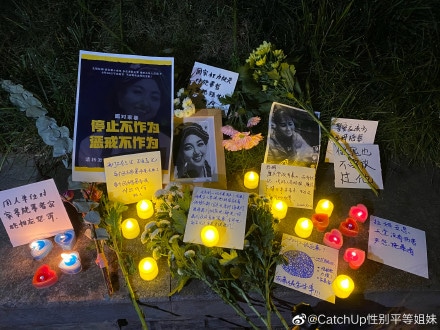
A memorial for Lamu after her death, posted on Weibo.
Lamu’s funeral was held at a local temple on October 5. The hashtag “Lamu is Cremated Today” (#拉姆今日火化#) received over 310 million views on Weibo.
“Domestic violence is not a family issue!”
In the wake of Lamu’s death, and despite censorship, Chinese netizens started speaking out against domestic violence, advocating for better laws and support systems for domestic abuse victims in China.
An online poster that was shared online by hundreds of netizens says:
“Vlogger Lamu suffered domestic abuse for over ten years. She reached out for help many times to no avail. She was burnt by her ex-husband and died on September 30th. We can’t let this kind of tragedy happen again! Let’s confront a lack of action in the face of domestic violence, inaction should be punished. Please forward and make women’s voices against domestic violence heard!”

Chinese actress Li Bingbing (李冰冰) also spoke out about the matter on Weibo, saying: “Don’t be indifferent, don’t stay silent, domestic violence is not a family matter, it is a crime!”
Many raising their voice against domestic violence mention how Lamu’s case, unfortunately, is not unique. There have been similar cases before, and there are millions suffering behind closed doors. A 2016 survey by the All-China Women’s Federation estimated that 30% of married Chinese women had experienced some form of domestic violence.
Domestic abuse was officially criminalized with China’s first national law against domestic violence in 2016, but it is still a widespread problem, partly due to a general lack of public awareness of domestic abuse and police officers regarding it as a private family matter, downplaying its severity.
Another issue is how the legal repercussions for the perpetrators of domestic violence are often mild or even non-existent.
As noted by author Hao Yang in this article, the Chinese law’s definition of domestic violence covers physical and psychological violence, yet does not explicitly include sexual violence such as marital rape. The law also does not include violence against former spouses or partners who do not live together.
There is also no clear national implementation guideline for China’s Domestic Violence Law, and no standard procedure for protecting victims.
Lamu’s death has stirred online discussions on the importance of addressing all of these aforementioned problems. These kinds of online discussions on domestic violence have risen before, but the voices have rarely been as loud as they are now.
“Domestic violence is the most frightening and harmful type of violence since it comes from within one’s own family. If the police are useless, then how can women ever protect themselves?”, one Weibo commenter writes, with another person responding: “Domestic violence is not a family issue! I hope the relevant authorities will start paying more attention to this!”
“We need a ‘Lamu Bill'”
One popular Weibo user, a screenwriter from Beijing with approximately 240,000 followers, argues that the intervention of authorities in domestic abuse cases is sometimes literally a matter of life and death.
“Women who are victims of domestic violence should not have only two destinies,” the blogger writes: “..either being beaten to death or struggling to kill.”
This blogger, along with other social media users, also mentions other cases where the non-intervention of local authorities in domestic abuse cases led to a tragic ending.
Two of the cases often mentioned together with Lamu’s case are that of Dong Shanshan (董珊珊), Li Yan (李彦), and Ms. Liu (刘女士).
Dong Shanshan was a 26-year-old woman from Beijing who suffered abuse from her husband shortly after getting married. Dong and her family reported the abuse to the police a total of 8 times, but the police allegedly were reluctant to intervene in something that was deemed a “family dispute.” After another beating by her husband, Dong died of internal organ failure in 2009. Her husband was sentenced to six years in prison.

Dong Shanshan
Li Yan suffered abuse by her husband Tan Yong ever since they got married in 2009. Although Li reported the abuse to the local justice department, police, and the All-China Women’s Federation, local authorities did not intervene. When the abuse got worse – including Tan hitting Li’s head against the wall, hacking off one of her fingers, and stubbing out cigarettes on her face and body, – Li (accidentally) killed her drunken husband with a gun barrel after he threatened to shoot her. Li was sentenced to death in 2011. The sentence was overturned in 2015 and commuted to life in prison.
Ms. Liu‘s case made headlines after the woman from Henan jumped from a second-story window to escape domestic violence. Footage of Liu landing on the street – a fall that left her temporarily paralyzed – went viral earlier this year when it became known that Liu had filed for divorce but this was denied by a local court. The court reportedly denied Liu’s petition for divorce due to her husband’s unwillingness to separate, and because her claims of domestic violence could not be verified without a criminal complaint. In the summer of 2020, Liu was finally granted a divorce.
A law that was released in 2020 introduced a mandatory “cooling off period” of thirty days after couples file for divorce. The law is allegedly intended to make people think twice before officially separating, but it also triggered public outrage for making victims of domestic violence even more vulnerable.

Lamu
In light of Lamu’s case, many people on Weibo and Douyin now support a so-called ‘Lamu Bill’ (拉姆法案), that should legally empower victims of domestic abuse, more so than the current law on domestic abuse does.
Netizens suggest it should include the automatic dissolution of a marriage once one side wants a divorce for one’s own personal safety, and that it should criminalize marital rape.
“We need the ‘Lamu Bill’, we can’t let these kinds of cases happen again,” multiple commenters say, with others also writing “if you don’t speak up, nothing will ever change.” One post on the issue received over 630,000 likes.
On Weibo, the hashtag page for the topic has now been taken offline and many people note that the topic has been taken down from Weibo hot search lists.
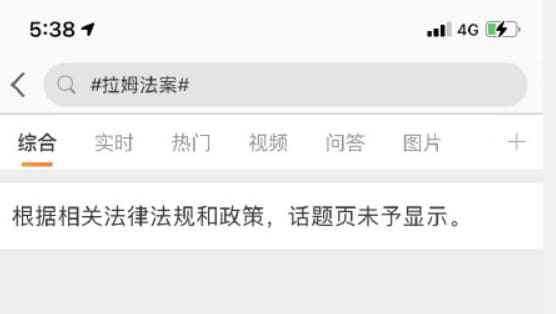
At the time of writing, the hashtag “Stop Nonfeasance” (#停止不作为#), that is also used to call for change and better enforcement of China’s domestic violence laws, is still open on Weibo and Douyin. On Douyin, many netizens speak out against domestic violence via video; on Weibo, they do so via posts and images.

Multiple images and videos show that the online movement against domestic violence also takes place offline, with people creating small memorials outside and leaving the “Stop Inaction” posters outside the Sichuan hospital.
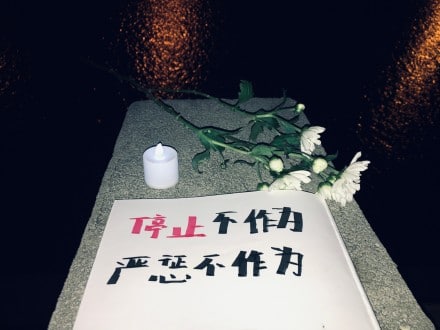
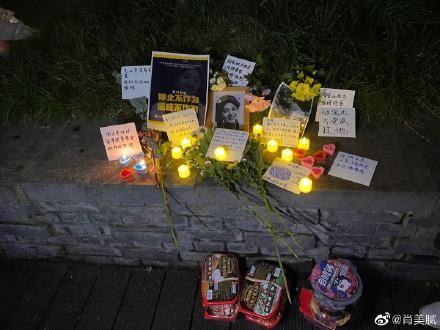
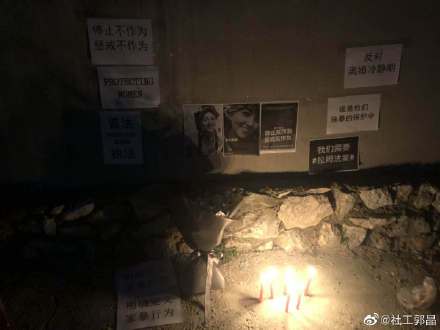
Besides the censored hashtag and the “Stop Nonfeasance” hashtag, there are also other terms and hashtags used by Weibo and Douyin users to get their message across.
Lamu’s story is passed on and has become much bigger than her tragic death alone. “I could be Lamu,” some female commenters say.
“When people stay silent, women have no way to speak up,” one person writes. And so, through online and offline memorials, posters, hashtags, and photos, the calls for action against domestic violence are everywhere. Even in the face of censorship, many social media users seem determined to make their voices heard.
By Manya Koetse , with contributions by Miranda Barnes
Follow @WhatsOnWeibo
Spotted a mistake or want to add something? Please let us know in comments below or email us. First-time commenters, please be patient – we will have to manually approve your comment before it appears.
©2020 Whatsonweibo. All rights reserved. Do not reproduce our content without permission – you can contact us at info@whatsonweibo.com.
Manya Koetse is the founder and editor-in-chief of whatsonweibo.com. She is a writer, public speaker, and researcher (Sinologist, MPhil) on social trends, digital developments, and new media in an ever-changing China, with a focus on Chinese society, pop culture, and gender issues. She shares her love for hotpot on hotpotambassador.com. Contact at manya@whatsonweibo.com, or follow on Twitter.

Also Read
China Insight
The Tragic Story of “Fat Cat”: How a Chinese Gamer’s Suicide Went Viral
The story of ‘Fat Cat’ has become a hot topic in China, sparking widespread sympathy and discussions online.
Published
3 months agoon
May 9, 2024
The tragic story behind the recent suicide of a 21-year-old Chinese gamer nicknamed ‘Fat Cat’ has become a major topic of discussion on Chinese social media, touching upon broader societal issues from unfair gender dynamics to businesses taking advantage of grieving internet users.
The story of a 21-year-old Chinese gamer from Hunan who committed suicide has gone completely viral on Weibo and beyond this week, generating many discussions.
In late April of this year, the young man nicknamed ‘Fat Cat’ (胖猫 Pàng Māo, literally fat or chubby cat), tragically ended his life by jumping into the river near the Chongqing Yangtze River Bridge (重庆长江大桥) following a breakup with his girlfriend. By now, the incident has come to be known as the “Fat Cat Jumping Into the River Incident” (胖猫跳江事件).
News of his suicide soon made its rounds on the internet, and some bloggers started looking into what was behind the story. The man’s sister also spoke out through online channels, and numerous chat records between the young man and his girlfriend emerged online.
One aspect of his story that gained traction in early May is the revelation that the man had invested all his resources into the relationship. Allegedly, he made significant financial sacrifices, giving his girlfriend over 510,000 RMB (approximately 71,000 USD) throughout their relationship, in a time frame of two years.
When his girlfriend ended the relationship, despite all of his efforts, he was devastated and took his own life.
The story was picked up by various Chinese media outlets, and prominent social and political commentator Hu Xijin also wrote a post about Fat Cat, stating the sad story had made him tear up.
As the news spread, it sparked a multitude of hashtags on Weibo, with thousands of netizens pouring out their thoughts and emotions in response to the story.
Playing Games for Love
The main part of this story that is triggering online discussions is how ‘Fat Cat,’ a young man who possessed virtually nothing, managed to provide his girlfriend, who was six years older, with such a significant amount of money – and why he was willing to sacrifice so much in order to do so.
The young man reportedly was able to make money by playing video games, specifically by being a so-called ‘booster’ by playing with others and helping them get to a higher level in multiplayer online battle games.
According to his sister, he started working as a ‘professional’ video gamer as a means of generating money to satisfy his girlfriend, who allegedly always demanded more.
He registered a total of 36 accounts to receive orders to play online games, making 20 yuan per game (about $2.80). Because this consumed all of his time, he barely went out anymore and his social life was dead.
In order to save more money, he tried to keep his own expenses as low as possible, and would only get takeout food for himself for no more than 10 yuan ($1,4). His online avatar was an image of a cat saying “I don’t want to eat vegetables, I want to eat McDonald’s.”

The woman in question who he made so many sacrifices for is named Tan Zhu (谭竹), and she soon became the topic of public scrutiny. In one screenshot of a chat conversation between Tan and her boyfriend that leaked online, she claimed she needed money for various things. The two had agreed to get married later in this year.
Despite of this, she still broke up with him, driving him to jump off the bridge after transferring his remaining 66,000 RMB (9135 USD) to Tan Zhu.
As the story fermented online, Tan Zhu also shared her side of the story. She claimed that she had met ‘Fat Cat’ over two years ago through online gaming and had started a long distance relationship with him. They had actually only met up twice before he moved to Chongqing. She emphasized that financial gain was never a motivating factor in their relationship.
Tan additionally asserted that she had previously repaid 130,000 RMB (18,000 USD) to him and that they had reached a settlement agreement shortly before his tragic death.
Ordering Take-Out to Mourn Fat Cat
– “I hope you rest in peace.”
– “Little fat cat, I hope you’ll be less foolish in your next life.”
– “In your next life, love yourself first.”
These are just a few of the messages left by netizens on notes attached to takeout food deliveries near the Chongqing Yangtze River Bridge.

AI-generated image spread on Chinese social media in connection to the event.
As Fat Cat’s story stirred up significant online discussion, with many expressing sympathy for the young man who rarely indulged in spending on food and drinks, some internet users took the step of ordering McDonalds and other food delivery services to the bridge, where he tragically jumped from, in his honor.
This soon snowballed into more people ordering food and drinks to the bridge, resulting in a constant flow of delivery staff and a pile-up of take-out bags.

Delivery food on the bridge, photo via Weibo.
However, as the food delivery efforts picked up pace, it came to light that some of the deliveries ordered and paid for were either empty or contained something different; certain restaurants, aware of the collective effort to honor the young man, deliberately left the food boxes empty or substituted sodas or tea with tap water.

At least five restaurants were caught not delivering the actual orders. Chinese bubble tea shop ChaPanda was exposed for substituting water for milk tea in their cups. On May 3rd, ChaPanda responded that they had fired the responsible employee.
Another store, the Zhu Xiaoxiao Luosifen (朱小小螺蛳粉), responded on that they had temporarily closed the shop in question to deal with the issue. Chinese fast food chain NewYobo (牛约堡) also acknowledged that at least twenty orders they received were incomplete.
Fast food company Wallace (华莱士) responded to the controversy by stating they had dismissed the employees involved. Mixue Ice Cream & Tea (蜜雪冰城) issued an apology and temporarily closed one of their stores implicated in delivering empty orders.
In the midst of all the controversy, Fat Cat’s sister asked internet users to refrain from ordering take-out food as a means of mourning and honoring her brother.
Nevertheless, take-out food and flowers continued to accumulate near the bridge, prompting local authorities to think of ways of how to deal with this unique method of honoring the deceased gamer.
Gamer Boy Meets Girl
On Chinese social media, this story has also become a topic of debate in the context of gender dynamics and social inequality.
There are some male bloggers who are angry with Tan Zhu, suggesting her behaviour is an example of everything that’s supposedly “wrong” with Chinese women in this day and age.
Others place blame on Fat Cat for believing that he could buy love and maintain a relationship through financial means. This irked some feminist bloggers, who see it as a chauvinistic attitude towards women.
A main, recurring idea in these discussions is that young Chinese men such as Fat Cat, who are at the low end of the social ladder, are actually particularly vulnerable in a fiercely competitive society. Here, a gender imbalance and surplus of unmarried men make it easier for women to potentially exploit those desperate for companionship.
The story of Fat Cat brings back memories of ‘Mo Cha Official,’ a not-so-famous blogger who gained posthumous fame in 2021 when details of his unhappy life surfaced online.
Likewise, the tragic tale of WePhone founder Su Xiangmao (苏享茂) resurfaces. In 2017, the 37-year-old IT entrepreneur from Beijing took his own life, leaving behind a note alleging blackmail by his 29-year-old ex-wife, who demanded 10 million RMB (±1.5 million USD) (read story).
Another aspect of this viral story that is mentioned by netizens is how it gained so much attention during the Chinese May holidays, coinciding with the tragic news of the southern China highway collapse in Guangdong. That major incident resulted in the deaths of at least 48 people, and triggered questions over road safety and flawed construction designs. Some speculate that the prominence given to the Fat Cat story on trending topic lists may have been a deliberate attempt to divert attention away from this incident.
‘Fat Cat’ was cremated. His family stated their intention to take necessary legal steps to recover the money from his former girlfriend, but Tan Zhu reportedly already reached an agreement with the father and settled the case. Nevertheless, the case continues to generate discussions online, with some people wondering: “Is it over yet? Can we talk about something different now?”

Fat Cat images projected in Times Square
However, given that images of the ‘Fat Cat’ avatar have even appeared in Times Square in New York by now (Chinese internet users projected it on one of the big LED screens), it’s likely that this story will be remembered and talked about for some time to come.
UPDATE MAY 25
On May 20, local authorities issued a lengthy report to clarify the timeline of events and details surrounding the death of “Fat Cat,” which had attracted significant attention across China.
The report concluded that there was no fraud involved and that “Fat Cat” and his girlfriend were in a genuine relationship. Tan did not deceive “Fat Cat” for money; the transfers were voluntary. Furthermore, Tan returned most of the money to his parents.
The gamer’s sister is reportedly still being investigated for potentially infringing on Tan’s privacy by disclosing numerous private details to the public.
In the end, one thing is clear in this gamer’s tragic story, which is that there are no winners.
By Manya Koetse
– With contributions by Miranda Barnes and Ruixin Zhang
Independently reporting China trends for over a decade. Like what we do? Support us and get the story behind the hashtag by subscribing:
Spotted a mistake or want to add something? Please let us know in comments below or email us. First-time commenters, please be patient – we will have to manually approve your comment before it appears.
©2024 Whatsonweibo. All rights reserved. Do not reproduce our content without permission – you can contact us at info@whatsonweibo.com.
China Brands, Marketing & Consumers
A Brew of Controversy: Lu Xun and LELECHA’s ‘Smoky’ Oolong Tea
Chinese tea brand LELECHA faced backlash for using the iconic literary figure Lu Xun to promote their “Smoky Oolong” milk tea, sparking controversy over the exploitation of his legacy.
Published
3 months agoon
May 3, 2024
It seemed like such a good idea. For this year’s World Book Day, Chinese tea brand LELECHA (乐乐茶) put a spotlight on Lu Xun (鲁迅, 1881-1936), one of the most celebrated Chinese authors the 20th century and turned him into the the ‘brand ambassador’ of their special new “Smoky Oolong” (烟腔乌龙) milk tea.
LELECHA is a Chinese chain specializing in new-style tea beverages, including bubble tea and fruit tea. It debuted in Shanghai in 2016, and since then, it has expanded rapidly, opening dozens of new stores not only in Shanghai but also in other major cities across China.
Starting on April 23, not only did the LELECHA ‘Smoky Oolong” paper cups feature Lu Xun’s portrait, but also other promotional materials by LELECHA, such as menus and paper bags, accompanied by the slogan: “Old Smoky Oolong, New Youth” (“老烟腔,新青年”). The marketing campaign was a joint collaboration between LELECHA and publishing house Yilin Press.

Lu Xun featured on LELECHA products, image via Netease.
The slogan “Old Smoky Oolong, New Youth” is a play on the Chinese magazine ‘New Youth’ or ‘La Jeunesse’ (新青年), the influential literary magazine in which Lu’s famous short story, “Diary of a Madman,” was published in 1918.
The design of the tea featuring Lu Xun’s image, its colors, and painting style also pay homage to the era in which Lu Xun rose to prominence.
Lu Xun (pen name of Zhou Shuren) was a leading figure within China’s May Fourth Movement. The May Fourth Movement (1915-24) is also referred to as the Chinese Enlightenment or the Chinese Renaissance. It was the cultural revolution brought about by the political demonstrations on the fourth of May 1919 when citizens and students in Beijing paraded the streets to protest decisions made at the post-World War I Versailles Conference and called for the destruction of traditional culture[1].
In this historical context, Lu Xun emerged as a significant cultural figure, renowned for his critical and enlightened perspectives on Chinese society.
To this day, Lu Xun remains a highly respected figure. In the post-Mao era, some critics felt that Lu Xun was actually revered a bit too much, and called for efforts to ‘demystify’ him. In 1979, for example, writer Mao Dun called for a halt to the movement to turn Lu Xun into “a god-like figure”[2].
Perhaps LELECHA’s marketing team figured they could not go wrong by creating a milk tea product around China’s beloved Lu Xun. But for various reasons, the marketing campaign backfired, landing LELECHA in hot water. The topic went trending on Chinese social media, where many criticized the tea company.
Commodification of ‘Marxist’ Lu Xun
The first issue with LELECHA’s Lu Xun campaign is a legal one. It seems the tea chain used Lu Xun’s portrait without permission. Zhou Lingfei, Lu Xun’s great-grandson and president of the Lu Xun Cultural Foundation, quickly demanded an end to the unauthorized use of Lu Xun’s image on tea cups and other merchandise. He even hired a law firm to take legal action against the campaign.
Others noted that the image of Lu Xun that was used by LELECHA resembled a famous painting of Lu Xun by Yang Zhiguang (杨之光), potentially also infringing on Yang’s copyright.
But there are more reasons why people online are upset about the Lu Xun x LELECHA marketing campaign. One is how the use of the word “smoky” is seen as disrespectful towards Lu Xun. Lu Xun was known for his heavy smoking, which ultimately contributed to his early death.
It’s also ironic that Lu Xun, widely seen as a Marxist, is being used as a ‘brand ambassador’ for a commercial tea brand. This exploits Lu Xun’s image for profit, turning his legacy into a commodity with the ‘smoky oolong’ tea and related merchandise.
“Such blatant commercialization of Lu Xun, is there no bottom limit anymore?”, one Weibo user wrote. Another person commented: “If Lu Xun were still alive and knew he had become a tool for capitalists to make money, he’d probably scold you in an article. ”
On April 29, LELECHA finally issued an apology to Lu Xun’s relatives and the Lu Xun Cultural Foundation for neglecting the legal aspects of their marketing campaign. They claimed it was meant to promote reading among China’s youth. All Lu Xun materials have now been removed from LELECHA’s stores.

Statement by LELECHA.
On Chinese social media, where the hot tea became a hot potato, opinions on the issue are divided. While many netizens think it is unacceptable to infringe on Lu Xun’s portrait rights like that, there are others who appreciate the merchandise.
The LELECHA controversy is similar to another issue that went trending in late 2023, when the well-known Chinese tea chain HeyTea (喜茶) collaborated with the Jingdezhen Ceramics Museum to release a special ‘Buddha’s Happiness’ (佛喜) latte tea series adorned with Buddha images on the cups, along with other merchandise such as stickers and magnets. The series featured three customized “Buddha’s Happiness” cups modeled on the “Speechless Bodhisattva” (无语菩萨), which soon became popular among netizens.

The HeyTea Buddha latte series, including merchandise, was pulled from shelves just three days after its launch.
However, the ‘Buddha’s Happiness’ success came to an abrupt halt when the Ethnic and Religious Affairs Bureau of Shenzhen intervened, citing regulations that prohibit commercial promotion of religion. HeyTea wasted no time challenging the objections made by the Bureau and promptly removed the tea series and all related merchandise from its stores, just three days after its initial launch.
Following the Happy Buddha and Lu Xun milk tea controversies, Chinese tea brands are bound to be more careful in the future when it comes to their collaborative marketing campaigns and whether or not they’re crossing any boundaries.
Some people couldn’t care less if they don’t launch another campaign at all. One Weibo user wrote: “Every day there’s a new collaboration here, another one there, but I’d just prefer a simple cup of tea.”
By Manya Koetse
[1]Schoppa, Keith. 2000. The Columbia Guide to Modern Chinese History. New York: Columbia UP, 159.
[2]Zhong, Xueping. 2010. “Who Is Afraid Of Lu Xun? The Politics Of ‘Debates About Lu Xun’ (鲁迅论争lu Xun Lun Zheng) And The Question Of His Legacy In Post-Revolution China.” In Culture and Social Transformations in Reform Era China, 257–284, 262.
Independently reporting China trends for over a decade. Like what we do? Support us and get the story behind the hashtag by subscribing:
Spotted a mistake or want to add something? Please let us know in comments below or email us. First-time commenters, please be patient – we will have to manually approve your comment before it appears.
©2024 Whatsonweibo. All rights reserved. Do not reproduce our content without permission – you can contact us at info@whatsonweibo.com.
Subscribe

Weibo Watch: The Future is Here

“Bye Bye Biden”: Biden’s Many Nicknames in Chinese

Enjoying the ‘Sea’ in Beijing’s Ditan Park

A Triumph for “Comrade Trump”: Chinese Social Media Reactions to Trump Rally Shooting

Weibo Watch: Get Up, Stand Up

The Tragic Story of “Fat Cat”: How a Chinese Gamer’s Suicide Went Viral

“Old Bull Eating Young Grass”: 86-Year-Old Chinese Painter Fan Zeng Marries 36-Year-Old Xu Meng

A Brew of Controversy: Lu Xun and LELECHA’s ‘Smoky’ Oolong Tea

Singing Competition or Patriotic Fight? Hunan TV’s ‘Singer 2024’ Stirs Nationalistic Sentiments

Zara Dress Goes Viral in China for Resemblance to Haidilao Apron

Weibo Watch: The Battle for the Bottom Bed

About the “AI Chatbot Based on Xi Jinping” Story

China’s Intensified Social Media Propaganda: “Taiwan Must Return to Motherland”

Weibo Watch: Telling China’s Stories Wrong

Saying Goodbye to “Uncle Wang”: Wang Wenbin Becomes Chinese Ambassador to Cambodia
Get in touch
Would you like to become a contributor, or do you have any tips or suggestions? Get in touch here!
Popular Reads
-

 China Insight3 months ago
China Insight3 months agoThe Tragic Story of “Fat Cat”: How a Chinese Gamer’s Suicide Went Viral
-

 China Music4 months ago
China Music4 months agoThe Chinese Viral TikTok Song Explained (No, It’s Not About Samsung)
-

 China Digital10 months ago
China Digital10 months agoToo Sexy for Weibo? Online Discussions on the Concept of ‘Cābiān’
-

 China Arts & Entertainment12 months ago
China Arts & Entertainment12 months agoBehind 8 Billion Streams: Who is Dao Lang Cursing in the Chinese Hit Song ‘Luocha Kingdom’?




